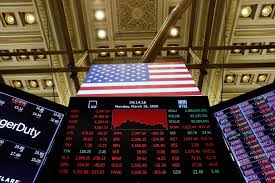World Shares Slide As Virus Fears Cloud Outlook For Recovery

World shares slipped Monday as rising virus cases caused some governments to backtrack on pandemic reopenings, or to warn they might have to.
Investors have been banking on businesses continuing to reopen, helping to drive a recovery from the worst global downturn since the 1930s Great Depression.
But progress has been halting. Wall Street saw a selloff Friday after Texas and Florida reversed course and clamped down on bars again in the nation’s biggest retreat yet. The new coronavirus has surged back in many places, especially the American South and West.
Asian markets extended that decline, and shares opened mostly lower Monday in Europe, where Germany’s DAX edged 0.1% lower to 12,077.79 and the CAC 40 in Paris dropped 0.6% to 4,878.94. Britain’s FTSE lost less than 0.1% to 6,155.85.
U.S. futures were barely changed, with the future for the S&P 500 flat at 3,006.30 and that for the Dow industrials also steady, at 24,947.00.
Concern has deepened as the number of confirmed cases topped 10 million, with more than 500,000 reported dead from COVID-19, according to a tally by Johns Hopkins University. Such data is thought to understate the problem due to issues with testing and a large number of asymptomatic cases.
In Asian trading, Tokyo’s Nikkei 225 gave up 2.3% to 21,995.04, while the Hang Seng in Hong Kong dropped 1.0% to 24,301.28. The Kospi in Seoul fell 1.9% to 2,093.48 and Australia’s S&P/ASX 200 gave up 1.5% to 5,815.00. The Shanghai Composite lost 0.6% to 2,961.52. India’s Sensex shed 0.8% and the SET in Bangkok also gave up 0.8%. Shares fell in Taiwan and Southeast Asia.
Even as virus outbreaks flare, economic data, which lag such daily measures of the pandemic, are signaling a recovery, albeit a fragile one.
“Conflicting signals between the Covid-19 spread and economic data continue to keep risk sentiment, and consequently markets, in a gridlock going into the end of June,” said Jingyi Pan of IG. “As far as the weekend leads are concerned, however, the topping of the 10 million mark for global COVID-19 cases had tipped the scale in the direction of risk-off for markets going into Monday.”
China reported that profits of major industrial companies rose 6% in May from a year earlier, to 582.3 billion yuan ($82.3 billion) as demand recovered and costs remained relatively low. That was up from a 4.3% drop in April.
China’s oil refiners and other heavy industries have profited from falling prices for crude and other commodities as global demand has waned amid the pandemic. But profits fell more than 19% in January-May, the National Bureau of Statistics reported.
The number of confirmed new coronavirus cases per day in the U.S. has surpassed 40,000 for three straight days, according to the Johns Hopkins tally, eclipsing the mark set during the deadliest stretch in late April. Deaths and hospitalizations have been rising in parts of the country, especially in the South and West.
The stock market is likely to remain volatile as traders weigh such ups and downs in the trajectory of the pandemic.
The yield on the 10-year Treasury note was steady at 0.65%. The yield tends to move with investors’ expectations for the economy and inflation and had been above 0.7% for most of last week.
Concern that a pullback in the reopening of businesses could hamper demand for energy is pulling oil prices lower. Benchmark U.S. crude oil for August delivery lost 66 cents to $37.83 per barrel in electronic trading on the New York Mercantile Exchange. It fell 23 cents on Friday to settle at $38.49 a barrel.
Brent crude oil for August delivery slipped 63 cents to $40.30 per barrel.
In currency dealings, the dollar bought 107.18 Japanese yen, down from 107.20 yen on Friday. The euro was trading at $1.1254, up from $1.1221.
